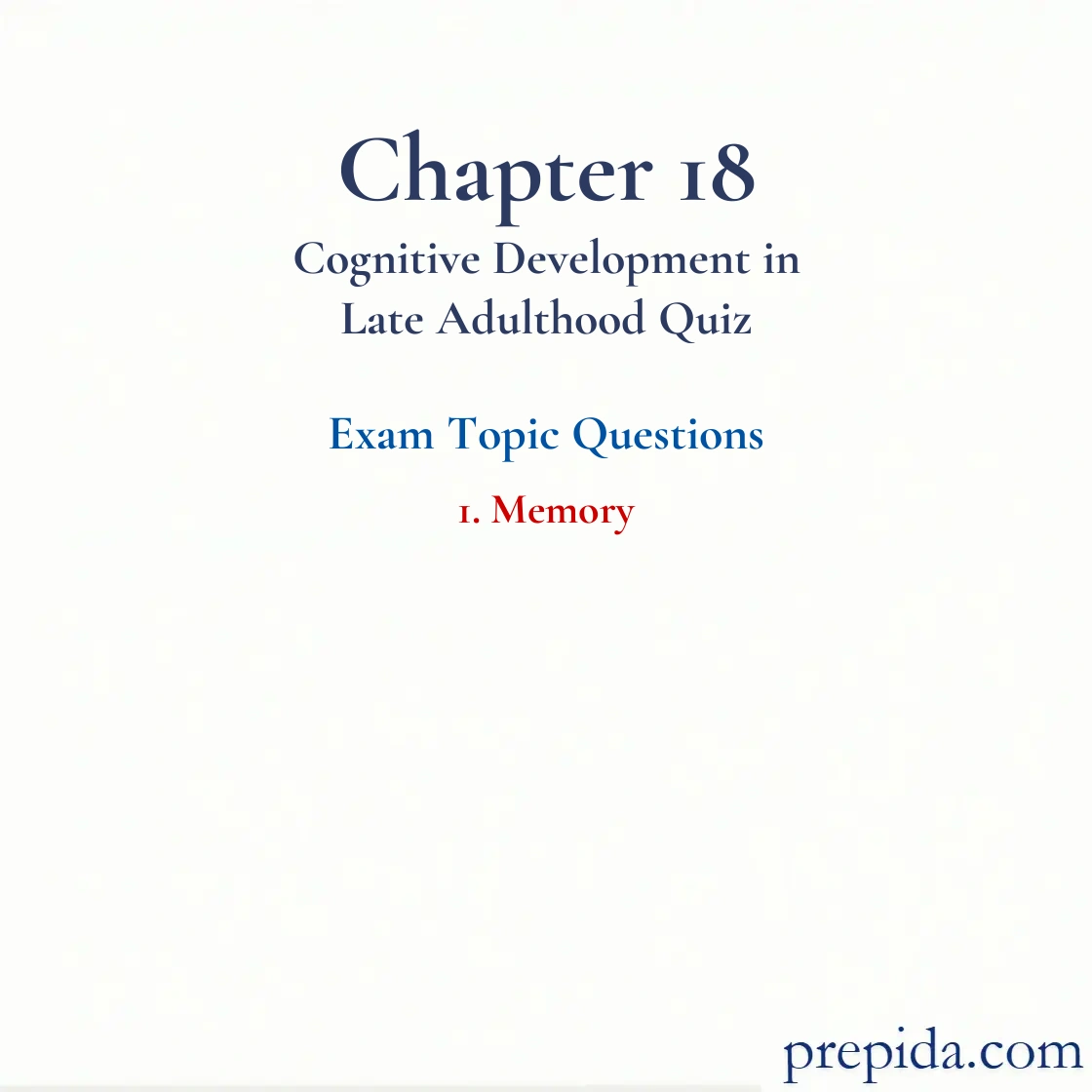
Perceptual speed shows considerable decline in late adulthood and is strongly linked to declines in
- selective attention.
- semantic memory.
- working memory.
- divided attention.
Working Memory: A mental “workbench” where individuals manipulate and assemble information when making decisions, solving problems, and comprehending written and spoken language.
Older adults have more difficulty determining the time required to step on the brakes when a traffic light suddenly turns red. This is because they have
- a decline in explicit memory.
- slower perceptual speed.
- inferior semantic memory.
- lost the ability to use their episodic memory.
Perception: The interpretation of what is sensed.
Which of the following is a probable reason for the decline in working memory in older adults?
- increased distractibility
- efficient inhibition
- tip-of-the-tongue phenomenon
- lowered implicit memory
Working Memory: A mental “workbench” where individuals manipulate and assemble information when making decisions, solving problems, and comprehending written and spoken language.
Which of the following is an example of explicit memory?
- John summarizes the plot of a novel that he has just read to his friend.
- Max drives the car from his office to his home.
- Linda turns off the lights before going to bed.
- Maria types on her computer while talking to her friend.
Explicit Memory: Memory of facts and experiences that individuals consciously know and can state.
________ memory is memory without conscious recollection.
- Implicit
- Prospective
- Source
- Explicit
Implicit Memory: Memory without conscious recollection; involves skills and routine procedures that are automatically performed.
Adeline, aged 90, still drives her car to the senior center every Friday. Last week, she tells her friends that someone they know from her church died. When they ask her for the person's name she says, "I can't remember her name. She sits near the altar and always has a hat on." Clearly, Adeline has better ________ memory than ________ memory.
- explicit; implicit
- implicit; explicit
- explicit; procedural
- source; trait
Memory: A central feature of cognitive development, pertaining to all situations in which an individual retains information over time.
Venette recounts a funny story that she had recently heard to her friend Clarice. Clarice tells her that she has heard the story before, and, in fact, she had been the one to originally tell the story to Venette. From the scenario, it can be said that Venette has poor ________ memory.
- prospective
- source
- fluid
- procedural
Source Memory: The ability to remember where one learned something.
Why are older adults more likely to forget what items they wanted to buy at a grocery store (unless they write them down on a list and take it with them) than forget how to drive a car?
- Perceptual speed declines with aging.
- Implicit memory is less likely to be adversely affected by aging than explicit memory.
- Source memory is more likely to decline with aging than prospective memory.
- Explicit memory declines more rapidly with aging than implicit memory.
Implicit Memory: Memory without conscious recollection; involves skills and routine procedures that are automatically performed.
Remembering how to ride a bike without having to consciously think about it is a part of an individual's ________ memory.
- declarative
- prospective
- implicit
- explicit
Implicit Memory: Memory without conscious recollection; involves skills and routine procedures that are automatically performed.
Which of the following is an example of implicit memory?
- being at a grocery store and remembering what an individual wanted to buy
- typing on a computer while talking to a friend
- being able to name the capital of Illinois
- recounting the events of a movie an individual has seen
Which of the following is true of implicit memory?
- It is also known as declarative memory.
- It is more likely to be adversely affected by aging than explicit memory is.
- It involves skills and routine procedures that are performed automatically.
- It is memory of facts and experiences that individuals consciously know and can state.
Explicit memory is also called ________ memory.
- collective
- procedural
- declarative
- false
Elaboration: An important strategy for remembering that involves engaging in more extensive processing of information.
80-year-old Lucia has difficulty remembering to call her son every Sunday at noon. This is most likely due to a decline in her ________ memory.
- source
- episodic
- implicit
- prospective
Prospective Memory: Remembering to do something in the future.
A person's knowledge about the world is called ________ memory.
- schematic
- functional
- normative
- semantic
Semantics: The meaning of words and sentences.